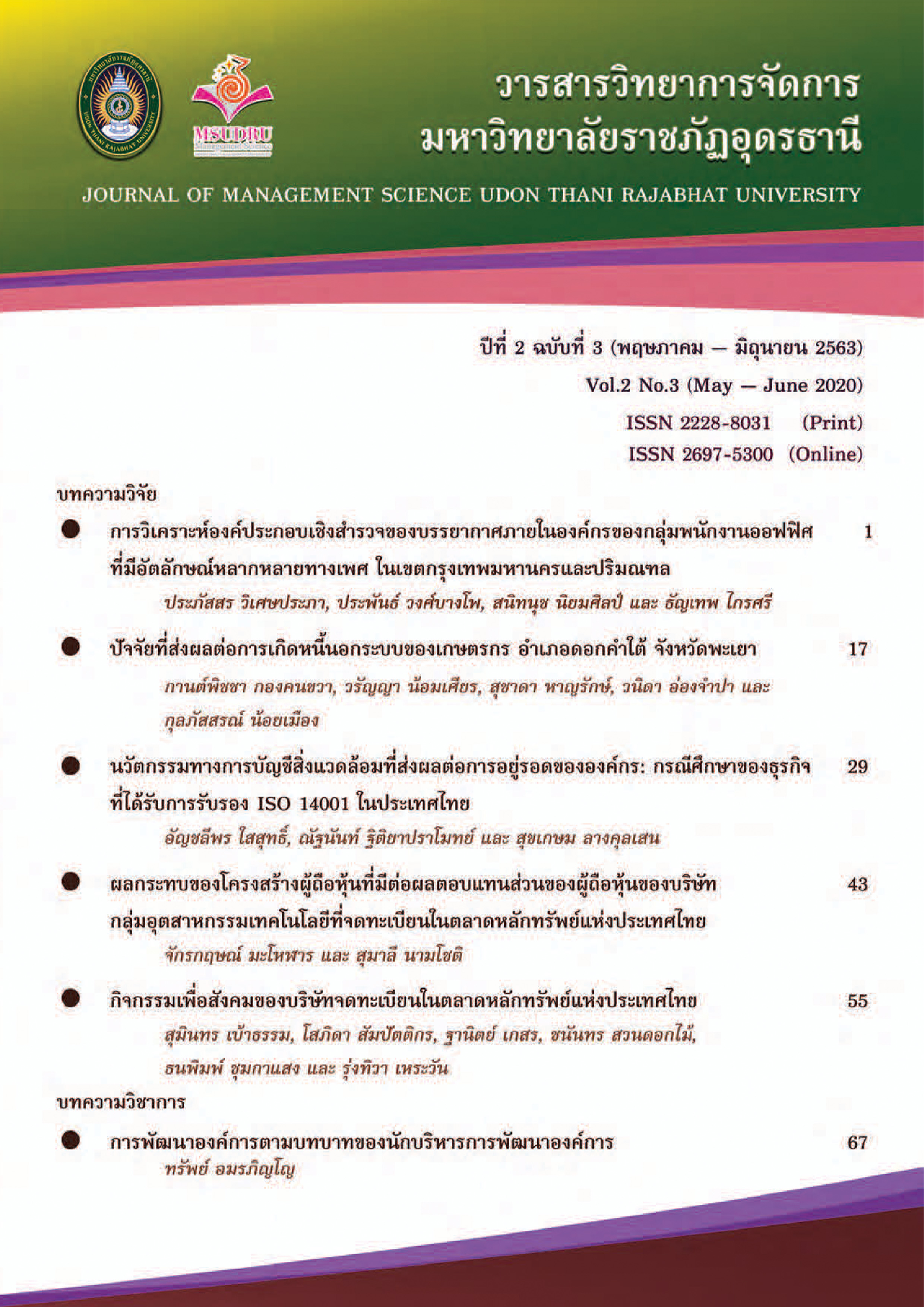การพัฒนาองค์การตามบทบาทของนักบริหารการพัฒนาองค์การ
Main Article Content
บทคัดย่อ
ในปัจจุบันองค์การมีการเปลี่ยนแปลงไปตามทิศทางของสภาพแวดล้อมที่เกิดขึ้นอย่างรวดเร็ว เพื่อให้รูปแบบของการดำเนินงานองค์การเกิดผลสำเร็จ และเป็นไปตามวัตถุประสงค์ขององค์การอย่างมีประสิทธิภาพและประสิทธิผล การเตรียมความพร้อม เพื่อรับมือต่อการเปลี่ยนแปลงต่างๆ จึงมีความสำคัญเป็นอย่างมาก เนื่องจากกระบวนการพัฒนาเป็นการหาสาเหตุของปัญหาและอุปสรรคต่างๆ เพื่อให้ได้แนวทางในการพัฒนาการบริหารจัดการแก้ไขปัญหาและอุปสรรคต่างๆ ที่เกิดขึ้น ซึ่งการพัฒนาแนวทางดังกล่าว จะเป็นตัวเสริมสร้างสมรรถนะให้กับองค์กร อีกทั้งบทบาทของนักบริหารการพัฒนาองค์การจะเป็นผู้ขับเคลื่อนให้องค์การผ่านวิกฤตปัญหาและอุปสรรคต่างๆ ที่เกิดขึ้นจากการเปลี่ยนแปลงของสภาพแวดล้อมในปัจจุบันบทความนี้จึงได้ทบทวนแนวคิด กระบวนการ และบทบาทของนักบริหารการพัฒนาองค์การที่เป็นปัจจัยหลักของการพัฒนาองค์การ เพื่อรับมือกับการเปลี่ยนแปลงของสภาพแวดล้อมในปัจจุบันอย่างยั่งยืน
Article Details

อนุญาตภายใต้เงื่อนไข Creative Commons Attribution-NonCommercial-NoDerivatives 4.0 International License.
บทความที่ได้รับการตีพิมพ์เป็นลิขสิทธิ์ของคณะวิทยาการจัดการ มหาวิทยาลัยราชภัฏอุดรธานี
ข้อความที่ปรากฏในบทความแต่ละเรื่องในวารสารวิชาการเล่มนี้
ไม่ใช่ความคิดเห็นและความรับผิดชอบของผู้จัดทำ บรรณาธิการ กองบรรณาธิการ และคณะวิทยาการจัดการ มหาวิทยาลัยราชภัฏอุดรธานี ความรับผิดชอบด้านเนื้อหาและการตรวจร่างบทความแต่ละเรื่องเป็นความคิดเห็นของผู้เขียนบทความแต่ละท่าน
เอกสารอ้างอิง
จันติมา จันทร์เอียด. (2550). องค์การและการจัดการ. สงขลา: มหาวิทยาลัยราชภัฏสงขลา.
จินตนา บุญบงการ. (2552). สภาพแวดล้อมทางธุรกิจ. กรุงเทพฯ: วี.พรินท์.
ชัยเสฏฐ์ พรหมศรี. (2551). ภาวะผู้นำร่วมสมัย Contemporary Leadership. กรุงเทพฯ: ปัญญาชน.
ณัฏฐพันธ์ เขจรนันทน์. (2551). พฤติกรรมองค์การ. กรุงเทพฯ: วี พริ้นท์.
มณีนุช ทรวงสุรัตนกุล. (2558). อิทธิพลของผู้บริหารระดับกลางในการพัฒนาองค์กรให้เป็นองค์กรแห่งนวัตกรรม กรณีศึกษา: บริษัท ทรู คอร์ปอเรชั่น จำกัด (มหาชน). วารสารวิชาการ Veridian E – Journal, Silpakorn University ฉบับภาษาไทย สาขามนุษยศาสตร์ สังคมศาสตร์ และศิลปะ, 9(1), 283 - 297.
วรวุฒิ อินทนนท์. (2560). การพัฒนาทรัพยากรมนุษย์เพื่อการพัฒนาองค์การ. วารสาร มจรสังคมศาสตร์ปริทรรศน์, 6(2), 617 - 626.
วีรวิชญ์ ปิยนนทศิลป์. (2559). ความเหมาะสมในการเปิดด่านจุดผ่านแดนถาวรไทย-เมียนมา อําเภอขุนยวม จังหวัดแม่ฮ่องสอน. พิฆเนศวร์สาร, 13(2), 93-107.
ศิริภัสสรศ์ วงศ์ทองดี. (2557). การพัฒนาทรัพยากรมนุษย์. กรุงเทพฯ: จุฬาลงกรณ์มหาวิทยาลัย.
ศิริวรรณ เสรีรัตน์ และคณะ. (2550). การวิจัยการตลาด. กรุงเทพฯ: เอ เอ็น การพิมพ์.
สุระศักดิ์ ชะมารัมย์. (2562). การเสริมสร้างความเข้มแข็งขององค์การสู่การเป็นองค์การแห่งการเรียนรู้โดยใช้กระบวนการพัฒนาทรัพยากรมนุษย์ในศตวรรษที่ 21. วารสารวิชาการและวิจัย มทร.พระนคร สาขามนุษยศาสตร์และสังคมศาสตร์, 4(1), 116-131.
อรอณงค์ สวัสดิ์บุรี. (2555). พฤติกรรมและการสื่อสารในองค์การ. กรุงเทพฯ: วี พริ้นท์.
Bennis, W. G. (1997). Organizing Genius: The Secrets of Creative Collaboration. Boston: Addison-Wesley.
Minor, J. B. (2005). Organizational Behavior 1: Essential Theories of Motivation and Leadership. New York: Routledge.
Virakul, B. (2015). Global challenges, sustainable development, and their implications for organizational performance. European Business Review, 27(4). 430-446.


